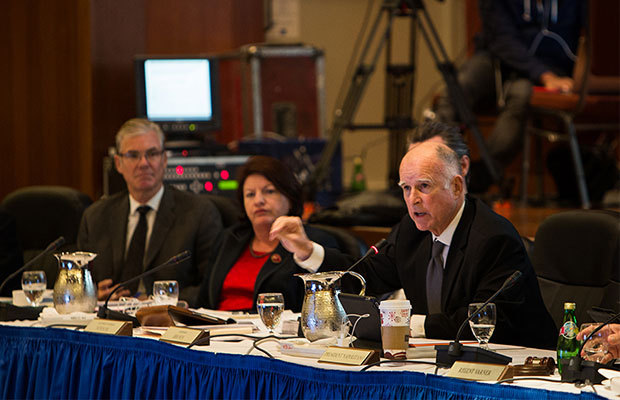Brown calls on UC to eliminate fee hike in 2015-16 proposed budget

By Sahil Chinoy
The university and state are at a standoff after Gov. Jerry Brown released his 2015-16 preliminary state budget Friday, which incorporates a $119.5 million increase in funding for the university — contingent on the university keeping tuition levels flat, despite its recent decision to raise tuition.
Unveiled at a press conference in Sacramento, the budget’s 4 percent funding increase for the university falls in line with the governor’s plan, which began in the 2013-14 fiscal year, to increase state funding and hold tuition flat over a four-year period. The budget proposes over $7.2 billion in funding for the university, more than 25 percent of the state’s total allocation for higher education.
The university’s 2015-16 budget, approved at a November meeting of the Board of Regents, plans for the $119.5 million increase but incorporates an additional $136.6 million expected from either additional state funds or a tuition increase.
In November, the Regents passed a tuition increase plan which allows fees to increase by up to 5 percent per year over the next five years. The increases could be mitigated or eliminated by additional state funding. According to the university’s plan, in the coming academic year, California residents will see systemwide fees increase by $612, from $12,192 to $12,804.
The governor’s plan does not account for the additional revenue from this tuition increase, and instead calls for cutting costs.
“All cost containment strategies must be explored before asking California families to pay even more for tuition,” said the governor’s office in a press release.
In response to the proposal, UC President Janet Napolitano said in a press release that she was disappointed by what she saw as a lack of public support for the university. According to the release, the state pays the university less than half as much per student as in 1991.
“We look forward to continued productive discussions with the governor and the legislature so that the next generation of Californians has the same higher education opportunity as those in the past,” she said in the statement.
At the conference, Brown reiterated his November request for an advisory committee, staffed by the governor’s office and the UC Office of the President, to explore possible avenues for cost reduction.
By examining pension and healthcare reforms, the use of technology and collaboration with the California State University and community college systems, the committee can reduce the university’s cost structure, he said.
“(The UC) can be a fine university living within the funds we’ve appropriated,” Brown said.
The UC Student Association — which opposes the university’s tuition increase plan — said they agree with Brown that UC spending ought to be examined. But UCSA also urged for more student involvement in budget deliberations and said in a statement that it will “continue to unite and advocate for additional funding.”
“While students have advocated for a direct role in these negotiations from the start, this is now an opportune time for the student voice to not only be heard, but listened to,” said UCSA president Jefferson Kuoch-Seng in the statement.
The state budget proposal also expects the university to prevent nonresident enrollment from increasing. At the conference, Brown said he was concerned some California residents are unable to attend the university because of “someone coming in from 5,000 or 2,000 miles away.”
The university’s budget, however, proposes enrolling 2,000 more nonresident students, which, along with a 5 percent increase in supplemental tuition for nonresidents, would bring in an additional $50 million.
“While it’s good to have some foreign and out-of-state students, they should not be viewed as a financial mechanism,” Brown said. “They’re more for the intellectual environment of the school.”
The UC Regents will meet January 21-22 at UCSF, where they will receive an update on the governor’s proposed budget. The revised state budget will be available in May.
Calling the budget “precariously balanced,” Brown said everyone believes more money is better, but pointed out that some parts of the budget didn’t receive any additional funding.
“$120 million is not chump change,” he said. “It’s real money.”
[Source]: Daily Californian


